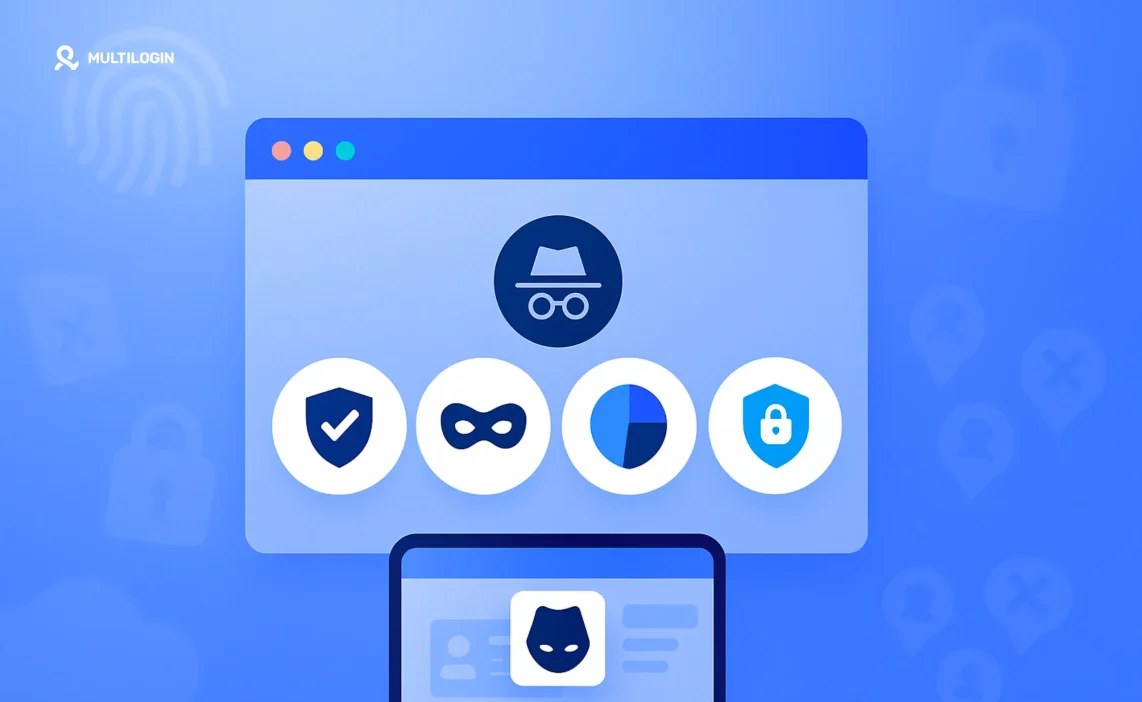Think Incognito mode is enough to keep your Chrome browsing truly private? Think again! Millions of Chrome users in 2026 are realizing that the basic “private” window isn’t the secret shield they hoped for. In a world of trackers, targeted ads, and digital fingerprints, it takes more than a dark-themed browser tab to browse anonymously.
Here’s the reality: Even in Incognito mode, Chrome still reveals plenty about your device, browsing habits, and even your identity to websites, search engines, and advertisers.
That’s why more people than ever are searching for the best anonymous browsing addon for Chrome, the best anonymous browsing extension for Chrome, and practical steps for how to browse anonymously Chrome—for real.
If you want to:
- Hide your activity from prying eyes
- Protect yourself from trackers and browser fingerprinting
- Manage multiple online accounts safely
- Or just stop feeling “watched” every time you open Chrome
…then you’re in the right place. This guide will show you how to turn on anonymous browsing in Chrome, reveal the top privacy extensions, and explain how to go beyond ordinary tools with solutions built for the privacy-first web.
Ready to level up your Chrome privacy? Let’s get started.
What Does “Anonymous Browsing” Mean on Chrome?
If you’re wondering how to browse anonymously Chrome or searching for the best anonymous browsing addon for Chrome, it helps to know what “anonymous” really means in the Chrome ecosystem.
The Basics: Incognito Mode
When most people think of anonymous browsing, they imagine Chrome’s Incognito Mode—a feature that stops your browsing history and cookies from being saved on your device.
But here’s what Incognito Mode really does:
- Hides your history from others using your computer
- Does NOT hide your activity from websites, trackers, your employer, or your internet provider
- Does NOT mask your IP address or browser fingerprint
Beyond Incognito: Real Anonymity
If you want true privacy, you need more than a simple Incognito window.
- Anonymous browsing on Chrome means using tools and techniques that block trackers, erase digital fingerprints, and make it much harder for anyone—ad networks, data brokers, even sophisticated platforms—to connect your online activity to you.
- This often requires the best anonymous browsing extension for Chrome, as well as advanced solutions like anti-detect browsers.
Key Terms Explained
- Anonymous browsing: Surfing the web in a way that hides your identity and activity from both local users and online trackers.
- Anonymous browsing Chrome: Using privacy features, extensions, and settings within Chrome to prevent data leaks.
- Best anonymous browsing addon/extension for Chrome: Special Chrome tools that block trackers, mask your fingerprint, and give you more control over what’s revealed about you online.
How to Turn On Anonymous Browsing in Chrome (Step by Step)
If you’re new to Chrome’s privacy features and wondering how to turn on anonymous browsing in Chrome, here’s how to get started:
Step 1: Open Incognito Mode
- On Desktop:
- Click the three dots (menu) in the top-right corner of Chrome.
- Select “New Incognito window.”
- Or, use the shortcut: Ctrl + Shift + N (Windows) or Command + Shift + N (Mac).
- On Mobile (Android/iOS):
- Tap the three dots in the lower or upper right.
- Tap “New Incognito tab.”
You’ll see a dark-themed window with the Incognito icon—this means Chrome has stopped saving your browsing history, cookies, and site data for this session.
What Incognito Mode Does:
- Hides your browsing history from others who use your device.
- Logs you out of most accounts and disables browser extensions by default (unless you specifically enable them for Incognito).
- Deletes cookies and site data when you close the window.
What Incognito Mode Does NOT Do:
- It does NOT hide your IP address from websites, your employer, or your ISP.
- It does NOT block web trackers or fingerprinting scripts that can still identify your device.
- It does NOT make you truly anonymous online.
Pro Tip: For real privacy, Incognito mode is just the first step. To achieve anonymous browsing Chrome users want, you’ll need to use powerful privacy extensions and (for true anonymity) consider anti-detect browsers.
Best Anonymous Browsing Addon for Chrome (2026 Picks)
So, you’ve used Incognito mode, but you want stronger privacy? The good news: Chrome’s Web Store offers dozens of privacy extensions to help you browse more anonymously. But not all are created equal!
Here are the best anonymous browsing addons for Chrome in 2026—ranked by effectiveness, ease of use, and how well they block trackers.
1. Privacy Badger
Blocks third-party trackers automatically. Learns as you browse, making your Chrome sessions less trackable.
Pros:
- No manual setup needed
- Blocks invisible tracking scripts
Cons:
- Doesn’t hide your IP or browser fingerprint completely
2. Ghostery
Blocks ads, trackers, and analytic scripts. Lets you customize which trackers are blocked per site.
Pros:
- Intuitive dashboard
- Detailed info on who’s tracking you
Cons:
- Some features behind a paywall
3. Trace
Specifically built to combat browser fingerprinting. Adds noise to fingerprinting attempts.
Pros:
- Focuses on anti-fingerprinting
- Regularly updated
Cons:
- May break some website features
4. Canvas Defender
Masks your Canvas fingerprint (a technique used by many sites to identify browsers).
Pros:
- Single-purpose, easy to toggle
- Good extra layer for the privacy-conscious
Cons:
- Only targets one aspect of fingerprinting
5. uBlock Origin
Blocks ads, trackers, malware, and pop-ups. Highly customizable.
Pros:
- Lightweight, open-source
- Blocks a huge range of trackers
Cons:
- Steeper learning curve for customization
Quick Comparison Table
Extension | Blocks Trackers | Anti-Fingerprint | Ad Blocking | Ease of Use |
Privacy Badger | Yes | Partial | No | Very Easy |
Ghostery | Yes | Partial | Yes | Easy |
Trace | Yes | Yes | No | Moderate |
Canvas Defender | No | Yes (Canvas) | No | Easy |
uBlock Origin | Yes | Partial | Yes | Moderate |
Which Is the Best Anonymous Browsing Extension for Chrome?
For most users, a combo of Privacy Badger (for trackers) and Trace or Canvas Defender (for fingerprinting) offers robust protection. If you want an all-in-one solution, Ghostery or uBlock Origin are also excellent choices.
But remember: Even the best anonymous browsing addon for Chrome has limits. For true, undetectable anonymity, you’ll want to explore anti-detect browsers.
How to Browse Anonymously Chrome: Advanced Strategies
While extensions are a great start, today’s web trackers are more advanced than ever. For true anonymous browsing Chrome users want, it pays to use a layered approach—combining privacy add-ons with smart browsing habits and next-level tools.
1. Combine Multiple Privacy Extensions
No single extension can block every tracker or fingerprinting attempt. Combine:
- Privacy Badger (tracker blocker)
- Trace or Canvas Defender (anti-fingerprinting)
- uBlock Origin or Ghostery (ads and malware blockers)
This covers a wide spectrum of threats, making it much harder for sites to identify or follow you.
2. Clear Data and Cookies Regularly
Even with Incognito mode and privacy extensions, trackers can sometimes persist.
- Clear cookies, site data, and cache often (especially after using important accounts).
- Restart Chrome between private sessions.
3. Limit the Use of Chrome Extensions
Ironically, installing too many unique extensions can make your browser fingerprint more unique!
- Stick to popular, well-maintained privacy add-ons.
- Disable or remove rarely used or suspicious extensions.
4. Use a VPN or Proxy for IP Privacy
While privacy extensions block tracking scripts, they don’t hide your IP address.
- Add a trusted VPN or proxy (Nodemaven is a solid choice) to mask your IP and geographic location.
- Remember, a VPN alone doesn’t stop browser fingerprinting—but it helps prevent location-based tracking.
5. Understand the Limits of Extensions
Even the best anonymous browsing extension for Chrome can’t fully disguise your browser fingerprint.
- Sophisticated trackers can still piece together your device details, fonts, plugins, screen size, and more—even in Incognito or with add-ons installed.
Go Beyond Extensions: Anti-Detect Browsers for Ultimate Privacy
Want to achieve what no single extension can do? For maximum privacy, security, and freedom from bans, serious users turn to anti-detect browsers—the ultimate solution for how to browse anonymously Chrome and the true alternative to the best anonymous browsing extension for Chrome.
What Are Anti-Detect Browsers?
Anti-detect browsers (like Multilogin) are special browsers designed from the ground up to defeat browser fingerprinting and tracking.
Instead of just blocking ads or clearing cookies, these tools let you:
- Create fully separate browser profiles—each with its own unique fingerprint, cookies, and device details
- Rotate browser fingerprints automatically so every session looks like a different person or device
- Pair with proxies or VPNs for extra IP privacy and location spoofing
- Manage unlimited accounts (social, e-commerce, ad, or affiliate) without cross-contamination or bans
Why Are Anti-Detect Browsers Superior to Extensions?
Feature | Privacy Extensions | Anti-Detect Browsers |
Block ads/trackers | Yes | Yes |
Mask browser fingerprint | Partially | Fully (customizable) |
Multi-accounting | No (or risky) | Yes (safe & scalable) |
Bypass bans/limits | No | Yes |
Ease of use | Easy | Easy with modern UI |
Who Should Use Anti-Detect Browsers?
- Marketers managing multiple ad or social accounts
- Researchers and recruiters who need stealth for data collection or candidate sourcing
- Business owners and affiliates running campaigns across platforms
- Privacy advocates who want to avoid being tracked, fingerprinted, or profiled online
Real-World Example: Multilogin
Multilogin is the industry leader for anti-detect browsing. With a few clicks, you can:
- Launch several Chrome-like profiles, each with its own unique “identity”
- Rotate your browser fingerprint, plugins, and location
- Pair with proxies for true anonymity
No extension comes close—this is why anti-detect browsers are the best anonymous browsing addon for Chrome alternatives in 2026.
Try Multilogin: The Ultimate Chrome Anonymous Browser Alternative
Don’t let your online identity be an open book.
Frequently Asked Questions About Chrome Anonymous Browsing
Yes! Incognito mode and free privacy extensions (like Privacy Badger or uBlock Origin) let you browse somewhat anonymously in Chrome. But for advanced privacy—like defeating browser fingerprinting or managing multiple identities—you’ll need dedicated tools like anti-detect browsers.
There are several top options:
- Privacy Badger (blocks trackers)
- Ghostery (blocks trackers and ads)
- Trace and Canvas Defender (anti-fingerprinting)
- uBlock Origin (blocks ads/malware): While these are the best anonymous browsing extensions for Chrome, no single extension offers total anonymity or fingerprint protection.
For most users, a combo of Privacy Badger and Trace or Canvas Defender works well. But if you need complete privacy (multi-accounting, ban protection, business use), Multilogin is the top anti-detect browser—far beyond any addon or extension.
- Open Chrome
- Click the three dots > “New Incognito window”
- Or press Ctrl+Shift+N (Windows) / Cmd+Shift+N (Mac). For deeper anonymity, add privacy extensions or use an anti-detect browser.
No—Incognito mode hides your activity from others on your device, but not from websites, trackers, or your internet provider. It doesn’t block fingerprinting or mask your IP.
Anti-detect browsers (like Multilogin) let you create multiple, unique browser profiles, rotate fingerprints, and pair with proxies—offering privacy that extensions alone can’t match.
Take Back Control of Your Privacy
In today’s hyper-tracked world, basic privacy settings just aren’t enough. If you want real control over your online identity, you need more than Incognito mode—you need the best anonymous browsing addon for Chrome, and, for ultimate protection, an anti-detect browser built for privacy-first users.
Here’s the bottom line: Extensions are a great start, but serious privacy—and total peace of mind—comes from using tools made for anonymous browsing. Whether you’re a marketer, entrepreneur, freelancer, or just privacy-conscious, the best time to upgrade your browsing is now.


